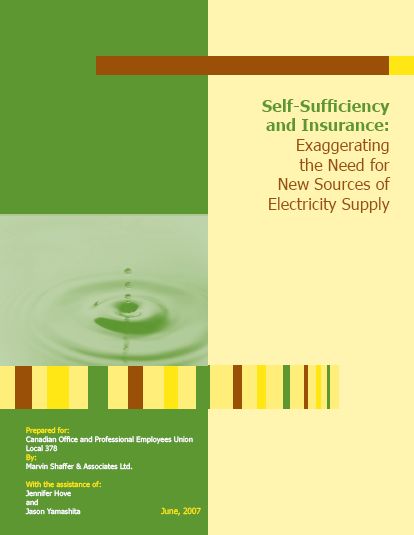

Customers pay more for B.C. energy plan: study
COMMENT: "The plan is not ... in the general public interest."
It's good to have Dr. Shaffer weighing in on a couple of points we've been making for some time.
- The "self-sufficient by 2016" goal is going to cost British Columbians a bundle - unnecessarily (With the money flowing out of our wallets and into those of private shareholders)
- The need for more domestic generation is exaggerated. (We believe it's a degree worse than that - a convenient lie, repeated often enough that it has become a "truth". It's BC's own WMD - words of mass deception. We'd welcome a significant donation to fund a study of the "net importer" shibboleth. )

Click here for the full report.
Customers pay more for B.C. energy plan: study
Province's plan for independent power 'not well considered'
Scott Simpson
Vancouver Sun
June 16, 2007
British Columbia's pursuit of energy independence is backfiring on BC Hydro customers who are being forced to buy expensive domestic electricity even when cheap import power is available as an alternative, according to a study paper obtained by The Vancouver Sun.
Economist Marvin Shaffer says the B.C. government's energy plan, launched in 2002, cost BC Hydro customers an additional $60 million last year -- and that will balloon to $160 million per year, equivalent to a 5.5-per-cent rate increase, by 2016.
"The plan is not well-considered, and it is not in the general public interest," Shaffer writes in an analysis titled Self-Sufficiency and Insurance: Exaggerating the Need for New Sources of Electricity Supply.
B.C.'s energy plan, updated in February 2007, calls for rapid development of an independent power sector to meet future electricity demand growth and eliminate reliance on import power for about eight to 10 per cent of annual consumption.
The study was commissioned by Canadian Office and Professional Employees Union Local 378 -- the local representing unionized BC Hydro employees.
COPE 378 is concerned about a loss of potential jobs for members as B.C. increases its reliance on independent power producers to meet the province's electricity requirements rather than expanding Hydro's operations.
Shaffer does not debate the merits of public versus private development of new electricity resources.
Shaffer's numbers are derived from testimony before the B.C. Utilities Commission by staff of BC Hydro, by legal counsel for the province's major industrial consumers of electricity, and in decisions rendered by BCUC staff.
He says the energy plan ignores BC Hydro's innate advantage in the North American electricity market -- a series of cheap and efficient hydroelectric generating systems that can be shut down when import power prices are low, and opened up when they're high.
Thermal-driven generating facilities in Alberta and the U.S. must run full time for mechanical reasons -- and need customers even during those hours when electricity market prices are at their lowest, he said.
That means B.C. can bring in at low cost 2,500 gigawatt hours (GWH) of electricity per year -- enough to power 250,000 homes year round. It imported triple that amount in 2005 without difficulty.
B.C. has been a net importer of electricity for six consecutive years -- coinciding with a series of dry years that had its reservoirs sitting as much as 20 per cent below capacity after spring runoff.
In an average water year, however, the reservoirs are full -- and B.C. will be committed to paying private-sector operators for power at fixed rates higher than what may be available on the open market, he said.
"As economists have long argued, there are benefits to trade. We should produce those goods and services for which we have a comparative advantage, and backup up fluctuating water conditions with high cost domestic sources of power supply may not be one of them."
The energy plan, first announced in 2002 and updated last year, calls for B.C. to be completely self-sufficient by 2016, and to have a surplus on hand by 2026 on the premise that the province needs to buffer itself from possible price volatility on the import market.
In pursuit of that policy, BC Hydro has issued a series of calls to independent power producers to add incrementally to the provincial electricity grid, mainly via small-scale run-of-river hydroelectric projects.
Shaffer estimated that the policy cost Hydro customers at least $60 million last year -- import power prices in all four fiscal quarters of 2006 were cheaper than the rates Hydro committed to pay independent power producers now operating under long-term contracts.
Shaffer says the fixed-term prices awarded to independents, or IPPS, in 2006 "are well above all but the highest forecasts of future market prices."
B.C. could annually import as much as 10,000 gigawatt hours (GWH) of electricity from sources in Alberta and the United States, he adds.
A more conservative import amount, 4,000 GWH, would displace the need for 100 to 200 small-hydro IPP sites, or a 500-turbine wind farm -- and eliminate the adverse environmental effects of those projects.
However, the self-sufficiency policy will commit B.C. to "buying power at higher prices than any forecast market prices," Shaffer said in an interview.
The policy also means we must pay a fixed rate to IPPs even when open market prices are lower.
"We are guaranteeing the prices to IPPs regardless of what the market will pay when it's surplus to our requirements."
COPE 378 communications director Mike Bruce said the energy plan is, in effect, "a solution for a problem that does not exist."
"The numbers really point out that this is a policy that is going to cost ratepayers and businesses a lot more and does nothing, ultimately, for energy security," Bruce said in an interview.
Self-Sufficiency and Insurance:
Exaggerating the Need for New Sources of Electricity Supply
Click here for the full report